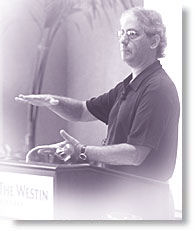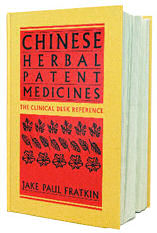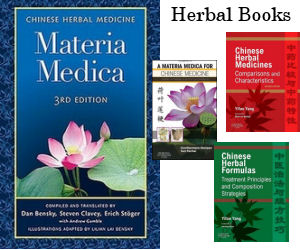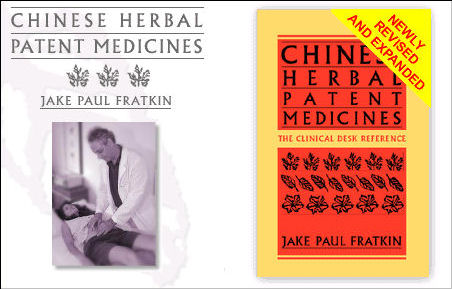Acupuncture & TCM Articles

Articles by Jake Paul Fratkin, OMD, LAc
Jake Fratkin, OMD, LAc, has been in the practice of Oriental medicine since 1978. Following undergraduate and graduate training at the University of Wisconsin in Chinese language and philosophy and pre-medicine, he pursued a seven-year apprenticeship in Japanese and Korean style acupuncture with Dr. Ineon Moon and a two-year apprenticeship in Chinese herbal medicine with Drs. Zhengan Guo and Pak-Leung Lau in Chicago. He also spent a year in Beijing hospitals interning in advanced herbal medicine, specializing in gastrointestinal and respiratory disorders, and pediatrics.  Dr. Fratkin is the author of several books, including Chinese Herbal Patent Medicines: The Clinical Desk Reference, and is the editor-organizer of Wu and Fischer's Practical Therapeutics of Traditional Chinese Medicine. In 1999, he was named the "Acupuncturist of the Year" by the American Association of Oriental Medicine.
Dr. Fratkin is the author of several books, including Chinese Herbal Patent Medicines: The Clinical Desk Reference, and is the editor-organizer of Wu and Fischer's Practical Therapeutics of Traditional Chinese Medicine. In 1999, he was named the "Acupuncturist of the Year" by the American Association of Oriental Medicine.
Chinese Herbal Patent Medicines: The Clinical Desk Reference
Hardback book, 1198 pages. This volume covers 1360 products, including 550 GMP level products and all of California FDB analysis on 505 products. Includes information on endagered animals, heavy metals, and pharmaceuticals. The text is organized into 12 groups, with a total of 109 chapters and includes material by Andrew Ellis, Subhuti Dharmananda, and Richard Ko. Over 80 pages of full-color photos (with English and Chinese cross-reference). Fully indexed.
Getting Off the Antibiotic Merry-Go-Round
When a patient comes into the clinic with an acute infection, I recommend that the herbal practitioner prioritize treatment of the infection over any other complaints. Most infections that come into the clinic are viral and include sore throat, common cold, influenza, ear infection, bronchitis, herpes simplex, herpes zoster, mononucleosis, acute viral syndrome (Coxsackie, Cytomegalia, West Nile, etc.), and vaccination reaction.1,2 Bacterial infections that we see in the clinic include strep throat, impetigo, minor infected wounds and boils, urinary tract infections and pink eye.
Serious bacterial infections, such as deep wounds, bacterial pneumonia and bacterial meningitis don't begin with a visit to a TCM practitioner, but rather to the emergency room. These conditions, as well as post-surgery, require pharmaceutical antibiotics and often accompany hospitalization. Here, antibiotics are truly miraculous, saving lives that otherwise might be lost to organ failure, systemic sepsis or gangrene.

The success of antibiotics in serious infections has been a great source of satisfaction to the medical world, and as a result, antibiotics are commonly given for less serious infections in outpatient clinics. Physicians will often prescribe antibiotics when they are unnecessary or unhelpful, such as viral infections or when no clear bacterial infection exists. These include ear infection, bronchitis, viral ("walking") pneumonia, sore throat, non-bacterial skin infections including eczema and acne, fever and chronic sinus infection.3,4 Often, the physician will justify the prescription as necessary for "avoiding a secondary infection," which rarely occurs.5
There are two reasons physicians overuse antibiotics. First, patients want a medicine, and doctors comply by using familiar medicines in their armory. It is the brave doctor who tells the patient that antibiotics won't work for their condition, and to go home and wait it out. Second, doctors are unaware or dismissive of effective herbal alternatives, leaving them the restrictive choice of antibiotics or no medicine at all.6
Whether indicated or not, there are two problems caused by the use of antibiotics. The one that is acknowledged by scientists and doctors is the creation of "super-bugs." As antibiotics have entered the human population in significant amounts, bacteria are mutating to form resistant strains that are disease-causing and drug resistant, such as methicillin-resistant staphylococcus aureus.7
The second, and in my opinion more important, consideration is the damage inflicted on a person's health by the use of antibiotics. The innate strength of one's immunity is dependent on the role of beneficial bacteria in the digestive tract. More than 500 different species of beneficial bacteria collectively destroy pathogenic microbes while also neutralizing harmful chemical toxins that the body is trying to excrete.8 When one ingests antibiotics, the beneficial intestinal bacteria are significantly impaired. This gives rise to dysbiosis: unnatural colonies of pathogenic fungus and bacteria. Now it is up to the body's immune agents, at the site of digestive-tract epithelia, to try and take the place of these protective bacteria.
Our immune system is unequipped for the task, and slowly we weaken. In Western physiology the stress affects the adrenals, endocrine support of the pituitary and thyroid glands, bone marrow WBC production, as well as compromising serotonin production in the gut. In terms of TCM, we see this stress affecting kidney and spleen qi with consequences for normal production of qi and blood. Our zheng qi weakens, allowing xie qi - pathogenic influences - to attack and compromise zang-fu function. The immune system crashes, and patients develop new infections. In my practice, especially with children, we see the "antibiotic merry-go-round"; children placed on antibiotics for repeated ear infections every six to eight weeks.9 How can we help this situation? Foremost is the avoidance of antibiotics except in situations where good alternatives do not exist.
Most outpatient bacterial infections affect the epithelia of the nose, throat, lung, skin, urethra and bladder. All of these can successfully be treated with formulas utilizing Chinese herbs that have antibacterial properties. In the Chinese materia medica, all of the herbs contained in the category "Clear Heat and Dry Dampness" have well-documented antibacterial effects.10 The yellow huang herbs, which contain berberine, include huang qin (Radix scutellariae), huang lian (Rhizoma coptidis), huang bai (Cortex phellodendri), long dan cao (Radix gentianae) and ku shen (Radix sophorae flavescentis).
While the anti-viral properties of herbs in the category "Clear Heat and Resolve Toxicity" are well known, many also exhibit strong antibacterial activity, including jin yin hua (Flos lonicerae), lian qiao (Fructus forsythiae), pu gong ying (Herba taraxaci), ban zhi lian (Herba sciutellariae barbatae), da qing ye (Folium isatidis), ban lan gen (Radix isatidis), chuan xin lian (Herba andrographis) and yu xing cao (Herba houttuyniae).11
Finally, a few herbs in the category "Drain Dampness" have antibacterial effects useful in bladder and kidney infections. These include deng xin cao (Medulla junci), bian xu (Herba polygoni avicularis), yin chen hao (Herba artemisiae scopariae), bi xie (Rhizoma dioscoreae hypoglaucae) and others.12
The foundation formula for any bacterial infection should be Huang Lian Jie Du Tang.13 This formula consists of huang lian, huang qin, huang bai and zhi zi (Fructus gardeniae). Scientific validation of its antibacterial effects can be found in numerous research articles.14 The formula can be used alone or in conjunction with other formulas, depending on the application. For example, in impetigo or infected wounds, Huang Lian Jie Du Tang can be combined with any number of skin formulas designed to clear heat and resolve toxins.15 If one can accept its bitter taste, one can use it as a mouthwash following dental work to minimize bacterial dissemination. In powder form, it can be applied directly to open or infected wounds.
For strep throat, one can use Huang Lian Jie Du Tang. More appropriate, however, is Pu Ji Xiao Du Yin.16 The formula was originally used in diphtheria epidemics during the Song dynasty and has a positive therapeutic effect for strep throat, tonsillitis and mumps.17 I would recommend combining it with topical applications of Watermelon Frost to solidify the effect. One could also use Huang Lian Shang Qing Pian, but be careful of the dosage of da huang (Radix et rhizoma rhei) which is quite high (17 percent) in most of the patent medicine versions, and can cause loose stools or diarrhea.
For urinary tract infections, Ba Zheng Tang has been effective in 85 percent of my patients.18 Dosage is recommended at three times per day, and will be required for one to three days. For eye infection and red eye due to trauma, the patent medicine Ming Mu Shang Qing Pian is valuable. Antibacterial herbs in this formula include zhi zi, huang lian, da huang, huang qin and lian qiao. Supportive herbs to bring the formula directly to the eye include ju hua (Flos chrysanthemi) and bai ji li (Fructus tribuli).
Several years ago, I had elective surgery to correct a deviated septum. In the procedure, pieces of x-ray film are sometimes inserted to prevent occlusion of the newly opened nasal canal. I went online to see what would be the risk of infection following the surgery. Normally, the risk is quite small and antibiotics are typically not recommended. In operations using the x-ray film, however, infections are almost certain. Following the procedure, within a few days, I was discharging smelly pus and phlegm. I sent a sample to the lab, and sure enough, a raging bacterial infection was underway. I elected not to use pharmaceutical antibiotics, and instead took a combination of the patent medicines Huang Lian Jie Du Tang and Bi Tong Wan four times per day. Within three days, the discharge was gone. Whereas pharmaceutical antibiotics are recommended for five to 14 days, my infection completely cleared in three days.
When we recommend against antibiotics for epithelial bacterial infections, we are not advocating against treatment. You must have confidence that Chinese herbal formulas are as effective as conventional antibiotics, without the massive destruction of necessary gut bacteria. Because of the widespread acceptance in medical recommendations for prescription antibiotics, I will say to patients, "Try the herbs for 24 hours. If there is no improvement, then yes, consider antibiotics. But if there is some improvement, try to stay on the herbs in order to avoid the stress of antibiotics on your immune system." This encourages the patient, and they typically find that the herbal approach is successful.
References
Heikkinen T, et al. Prevalence of various respiratory viruses in the middle ear during acute otitis media. N Engl J Med 1999;340:260-4, 312-3. Also see http://drjakefratkin.com/pdf/EarInfection.pdf.
See Acupuncture Today: "Treatment and Prevention of H1N1 Swine Flu," January, 2010; "Plotting Acute Cough," May, 2007; "The Potential Avian Flu Epidemic," April, 2006; "Modern Applications for Antiviral Therapy," March, 2005. Also see http://drjakefratkin.com: "Using Wen Bing Theory in the Treatment of Modern Epidemics"; "Treating Viral Infections with Chinese Herbal Products"; "Hepatitis C: Differentiation and Treatment According to Wu Boping"; and "Viruses."
Cantekin EI. Antibiotics to prevent acute otitis media and to treat otitis media with effusion. JAMA 1994;272(3):203-4.
Ong S. Bronchitis: Treatment & Medication. http://emedicine.medscape.com/article/807035-treatment.
Ironically, and for unknown reasons, antibiotics seem to help minimize phlegm production in viral cough and sinusitis.
This, of course, is due to negative propaganda promoted by the pharmaceutical industry for their own commercial interests. They will claim that scientific validation does not exist for herbal medicine, or else promote questionable research that negatively implicates herbal remedies. This ignores supportive research from other countries such as China or Japan.
Most of the antibiotics entering the human population, at least in the United States, are from animal products in the diet: eggs, beef, chicken, turkey, pork, farm-raised catfish and salmon, etc.
http://drjakefratkin.com/pdf/LeakyGutHandout.pdf.
Culpepper L, Froom J. Routine antimicrobial treatment of acute otitis media: Is it necessary? JAMA Nov 26,1997;278(20):1643-5.
Chen J, Chen T. Chinese Medical Herbology and Pharmacology. Art of Medicine Press, 2004, pp. 137-52; Bensky, et al. Chinese Herbal Medicine Materia Medica, 3rd Edition. Eastland Press, 2004, pp.130-47.
Chen and Chen, pp. 171-217.
Ibid, p. 399-427.
Huang Lian Jie Du Tang. Coptis Resolve Toxin Decoction. From Outer Platform (Imperial Library) Secret Essentials.
Chen J, Chen T. Chinese Herbal Formulas and Applications. Art of Medicine Press, 2009, pp. 342-5.
Fratkin J. Chinese Herbal Patent Medicines. Shya Publications, 2001, pp. 802-24.
Pu Ji Xiao Du Yin. Universal Benefit Disperse Toxin Cool-Decoction. From Dong-Yuan's Tested (and) Effective Formulas.
Chen J, Chen T. Chinese Herbal Formulas and Applications. Art of Medicine Press, 2009, p. 357.
Ba Zheng Tang. Eight Righteous (Ingredients) Decoction. From Heavenly Peace Benefit (the) People Harmonious Medicines Office of Formulas.
 
|
